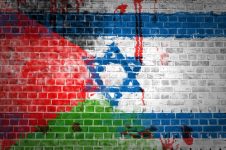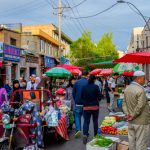Teen Activist Is Facing a Decade Behind Bars

The trial of 17-year-old Ahed Tamimi began on February 13 behind the closed doors of an Israeli military court. The young activist, who’s become an international symbol of the Palestinian struggle, is facing up to ten years behind bars.
On December 15 last year, two Israeli soldiers entered the front yard of Ms Tamimi’s family home in the occupied West Bank. The unarmed girl, who was 16 at the time, approached the two men, attempting to slap and punch them, in an effort to make them leave the property.
The confrontation occurred following a protest in Ms Tamimi’s village over US president Donald Trump’s announcement that he would recognise Jerusalem as Israel’s capital. Israeli soldiers allege that locals had been throwing stones at them during the demonstration.
Just an hour before Ms Tamimi sought to rid her front yard of the soldiers, she’d learnt that her 15-year-old cousin, Mohammed, had been shot in the head at close range by Israeli troops. The rubber bullet shattered his face and he was in a critical condition.
The soldiers in the yard, who were wearing protective gear at the time, didn’t report the incident. Ms Tamimi’s mother filmed it and later posted the footage on Facebook. And the clip subsequently went viral, much to the embarrassment of Israeli politicians, who demanded the girl be punished.
Occupied Palestinian territory
Ms Tamimi grew up in the village of Nabi Saleh, near Ramallah in the West Bank. Since 2009, locals have regularly been protesting the continuing encroachment of a nearby illegal Israeli settlement, known as Halamish, upon their land.
The settlement is located just 200 metres from the village and is adjacent to the Tamimi home. Halamish was built upon the former farmlands of Nabi Saleh, and it also acquired a spring that had been used by villagers.
Nabi Saleh is under the constant surveillance of the Israeli military. There’s a watchtower at the entrance to the village, and gates are installed on the roads leading in and out. There are heavy restrictions on movement, and road access can often be completely closed off.
A history of activism
Ms Tamimi comes from a family of Palestinian protesters. She witnessed her mother being arrested for disobeying soldiers when she was 8 years old, and when she was 10, her father was arrested and imprisoned for 14 months.
Bassem Tamimi, Ahed’s father, told the ABC that the family home has been raided by Israeli troops 200 times over the past five years. The prominent Palestinian activist also recalled that his daughter began actively taking part in the protests when she was around 7 or 8 years old.
Ms Tamimi is no stranger to gaining international attention over her confrontations with Israeli soldiers. There’s an image of her holding her fist up in front of one when she was just 8 years old, and a shot from 2015 shows her biting the hand of another.
It’s not uncommon for Palestinian children living in Nabi Saleh to throw stones at Israeli soldiers, who respond with tear gas, rubber bullets and live rounds. Since 2011, three young Palestinians have been shot dead in the village, two of which were Tamimi’s relatives.
A violation of human rights
Ahed Tamimi was arrested over the confrontation with the two soldiers in a night time raid on December 19. She has been charged with twelve separate offences, including assault and incitement.
One of the charges relates to an incident in April 2016. Her lawyer challenged the charge, as under Israeli laws the statute of limitations for a child is one year. However, the judge said that under military law it’s actually two years.
At her bail hearing on January 17, an Israeli military judge ruled that Ms Tamimi will be held on remand during her trial.
As Human Rights Watch senior researcher Bill Van Esveld pointed out, Ms Tamimi’s lawyer noted that under the Convention on the Rights of the Child, the detention of a youth is only permitted as a last resort, and for the shortest period of time.
However, the judge retorted that international human rights laws shouldn’t “be viewed as absolute.”
Systematic and institutionalised
Ms Tamimi’s detention isn’t an anomaly either. Each year, the Israeli military arrests, detains and prosecutes between 500 and 700 Palestinian children. At the end of November last year, there were 329 Palestinian children locked up in Israeli gaols.
And just as Ms Tamimi has been, close to 60 percent of sentenced minors are transferred from the occupied territories to prisons inside Israel in violation of article 49 of the Fourth Geneva Convention.
“The typical pattern is that children are arrested in the middle of the night and taken into a facility inside Israel or an Israeli settlement,” Australia Palestine Advocacy Network executive officer Jessica Morrison told Sydney Criminal Lawyers® in December 2016.
Ms Morrison went onto explain that the children then “face interrogation without a family member or a lawyer.” Once inside, child detainees are often confined in their shared cells for up to 18 to 20 hours a day, and around 15 percent are subjected to solitary confinement on occasion.
The Military Court Watch site monitors these child detentions. It has a long list of testimonies. And as you scroll through them, you find the majority of children are being arrested for the crime of throwing stones.
A grave injustice
Ms Tamimi’s next court appearance is scheduled for March 11. And while thousands around the world are calling for her to be freed, it’s unlikely she’ll be released, as Israeli military courts have a 99.7 percent conviction rate for Palestinians.
Amnesty International Middle East deputy director Magdalena Mughrabi said the actions that have been taken towards Ms Tamimi are a “blatantly disproportionate” punishment for an unarmed 16-year-old girl who “posed no actual threat.”
Indeed, many believe that the few aggressive gestures that a teenage girl perpetrated upon two heavily armed soldiers standing in the yard of her home are understandable. These men are symbols of the continued occupation of her land, and their comrades had just shot her cousin in the face.







